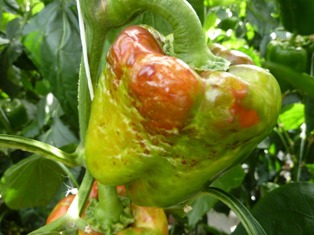Integrated Pest Management coordinator Tony Burfield and colleagues at SARDI have been instrumental in helping greenhouse growers tackle management of WFT. This pest has been one of the biggest economic threats for most vegetables growers since its arrival in the mid 90s.
Growers have to constantly battle to prevent heavy losses due to Tomato Spotted Wilt Virus (TSWV) that is spread by WFT as these pests are frequently resistant to available pesticides.
Tony Burfield said the odds have been recently turned in the growers’ favour with the availability of a new native predator for the thrips.
Known as Orius armatus (Orius), this small bug was discovered and reared in Western Australia several years ago by Manchil IPM Managing Director Lachlan Chilman.
Orius showed great promise as a bio-control agent because it feeds on adult as well as juvenile WFT. Control of adult thrips is critical as this is the life stage that carries TSWV from plant to plant.
Northern Adelaide Plains hydroponic growers Bill and Emmanuel Cafcakis have been passionate about replacing pesticides with biological control for some years.
Foreseeing an opportunity with Orius they approached SARDI and James Altmann from Biological Services at Loxton to conduct a comprehensive bio-control program for all pests in their capsicum crops.
In the absence of levy funding available for research and development, the Cafcakis brothers and Biological Services were supported by SARDI in applying for funding via the Horticulture Australia voluntary contribution program.
In a high-tech hydroponic capsicum system, planted in early September 2010, thrips and virus have been effectively controlled through to mid-February 2011.
During this six month period less than 100 plants out of 40 000 have been lost to Tomato Spotted Wilt Virus, compared to previous losses of 60% of all plants.
Thanks to Orius and support from SARDI, Biological Services and the WA breeder of Orius, the growers are again making some real money.
Burfield says that biological control requires both a desire for change and a real commitment by the growers to implementation, coupled with vigilant attention to what is happening in their crop. This has been clearly evident in the Cafcakis’ operation and has been critical to the success of the program.
In addition to the WFT all other key pests have been well controlled in the crop with minimal intervention through the release of about six bio-control agents.
"Biological control is challenging and it needs to be managed at every stage of the crop production cycle," Burfield said.
In this case there was very limited use of pesticides to suppress WFT and aphids and a few applications of Bacillus thuringienfis and a viral based pesticide to suppress chewing grubs early in the crop cycle.
A persistent outbreak of broad mite in one plant variety, near the greenhouse doorway, did require additional releases of predatory mites.
"Spraying alone is not an answer to pest control problems, but the application of soft chemicals are beneficial early on while the natural enemies are getting established," Burfield said.
"One very important lesson to be learnt with biological control is that growers need to ensure they do not allow pests populations to build prior to introducing the natural enemies, as this makes establishment difficult."







